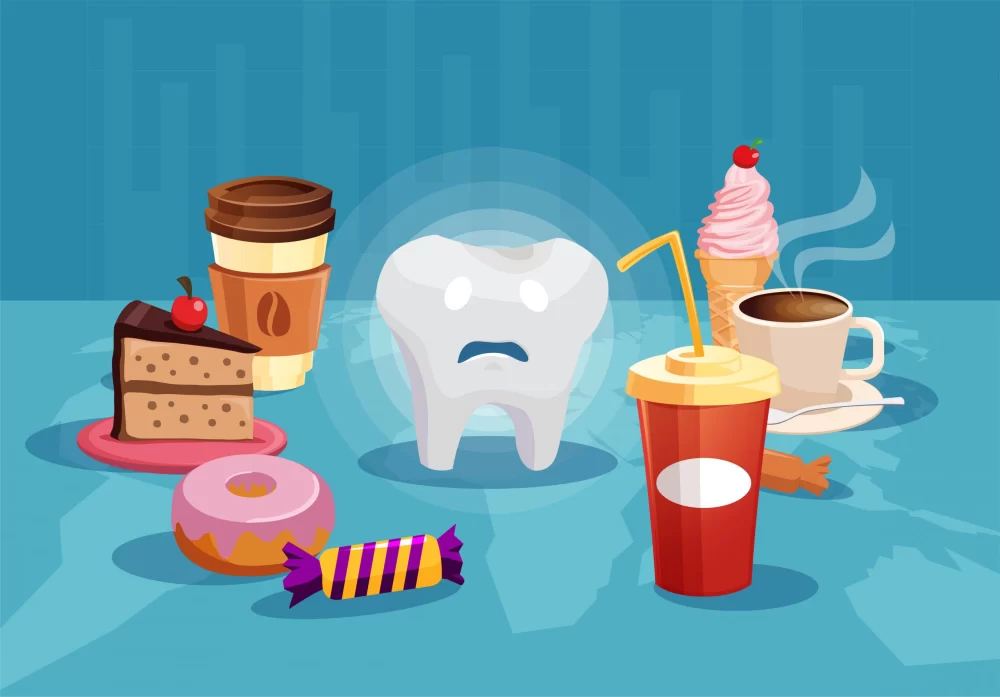
- Impact of Diet on Dental Health
- Foods That Are Best to Avoid for Dental Health
- Understanding How These Foods Affect Your Teeth
- Practical Tips for Healthy Eating Habits
- Professional Advice and Resources
1. Impact of Diet on Dental Health
Our dietary choices significantly influence the condition of our teeth and gums. While brushing and flossing are fundamental for oral hygiene, the foods we consume play a critical role in either protecting or damaging dental health. Certain foods can promote tooth decay, enamel erosion, and gum problems, while others support strong teeth and healthy gums.
Consider the story of Emily, who noticed persistent sensitivity and frequent cavities despite regular dental visits. After consulting her dentist, she learned that her daily consumption of sugary and acidic snacks was the primary culprit. This realization marked a turning point as Emily began avoiding foods harmful to teeth, leading to noticeable improvement over months.
Understanding which foods to avoid for dental health is essential for anyone aiming to maintain a bright smile and avoid costly dental procedures in the future.
1.1 Why Food Choices Matter Beyond Brushing
Even with excellent oral hygiene, consuming harmful foods can undermine dental care efforts. Sugars and acids in food interact with oral bacteria to produce acids that erode enamel, making teeth susceptible to cavities. Over time, this can lead to chronic dental issues that affect overall well-being.
2. Foods That Are Best to Avoid for Dental Health
Some foods are particularly damaging to teeth and should be limited or avoided to protect dental health effectively. Here we explore these foods in detail, explaining why they pose risks and how to manage their consumption.
2.1 Sugary Snacks and Candies
Sugary foods like candies, chocolates, and cookies are notorious for promoting tooth decay. The sugar feeds harmful bacteria in the mouth, which produce acids that attack tooth enamel. Sticky candies cling to teeth, prolonging acid exposure and increasing decay risk.
2.2 Acidic Beverages and Fruits
Beverages such as soda, sports drinks, and citrus juices contain high acid levels that erode enamel. Frequent consumption weakens teeth over time, leading to sensitivity and discoloration. Even some fruits like lemons and oranges, while healthy, should be consumed in moderation to avoid enamel damage.
2.3 Starchy and Processed Foods
Starchy foods like chips and white bread can break down into sugars and get trapped between teeth, feeding decay-causing bacteria. Processed foods often contain hidden sugars and additives that contribute to poor dental health.
2.4 Sticky and Dried Fruits
While dried fruits like raisins and dates are often considered healthy snacks, their sticky texture causes them to adhere to teeth, increasing cavity risk if not cleaned properly.
3. Understanding How These Foods Affect Your Teeth
The way harmful foods impact your teeth involves a complex interaction between diet, oral bacteria, and saliva. Bacteria metabolize sugars and starches into acids, which then dissolve the mineral structure of enamel.
Repeated acid attacks create microcavities, eventually forming visible decay. Saliva normally helps neutralize acids and repair enamel, but excessive exposure to damaging foods overwhelms this protective mechanism.
A notable example is the case of Tom, who regularly consumed soda and dried fruit throughout the day. He developed multiple cavities within a year, a situation that improved dramatically once he adjusted his diet under dental guidance.
3.1 The Role of Saliva and Oral Hygiene
Saliva is a natural defense, washing away food particles and buffering acids. However, foods that reduce saliva production or linger in the mouth extend acid exposure. This is why avoiding or limiting harmful foods is crucial alongside maintaining good brushing and flossing habits.
4. Practical Tips for Healthy Eating Habits
Avoiding the worst offenders for dental health doesn’t mean sacrificing enjoyment. Here are some practical strategies to protect your teeth while enjoying your meals:
4.1 Choose Tooth-Friendly Alternatives
Opt for fresh fruits like apples and pears, which naturally stimulate saliva and help clean teeth. Cheese and nuts are excellent snacks that help neutralize acids and provide calcium.
4.2 Timing and Frequency Matter
Limiting sugary and acidic foods to mealtimes reduces prolonged acid exposure. Frequent snacking, especially on harmful foods, increases decay risk.
4.3 Maintain Proper Oral Hygiene
Brush twice daily with fluoride toothpaste, floss regularly, and use mouthwash as recommended. Rinsing with water after consuming acidic or sugary foods also helps reduce acid effects.
5. Professional Advice and Resources
For tailored guidance on maintaining dental health through diet and hygiene, consulting dental professionals is essential. Dentistry Toothtruth provides expert recommendations and offers a range of products designed to support oral health, from fluoride treatments to specialized oral care tools.
Regular dental check-ups help monitor any diet-related dental issues early and allow for timely interventions, ensuring a healthy smile for years to come.







 Hawaii Kai Family & Cosmetic Dentistry3.0 (3 review)
Hawaii Kai Family & Cosmetic Dentistry3.0 (3 review) Arthur Glosman, DDS5.0 (366 review)
Arthur Glosman, DDS5.0 (366 review) Absolute Dental - Lake Mead4.0 (332 review)
Absolute Dental - Lake Mead4.0 (332 review) Articolo Orthodontics5.0 (4 review)
Articolo Orthodontics5.0 (4 review) Dr. Steven Harrison, DDS5.0 (7 review)
Dr. Steven Harrison, DDS5.0 (7 review) Dentistry for Children - Peachtree City4.0 (780 review)
Dentistry for Children - Peachtree City4.0 (780 review) The Importance of Oral Health Education During Pregnancy for a Healthy Pregnancy
The Importance of Oral Health Education During Pregnancy for a Healthy Pregnancy Best Tips for Brushing Your Teeth Properly for Healthy Gums: Essential Techniques for Oral Health
Best Tips for Brushing Your Teeth Properly for Healthy Gums: Essential Techniques for Oral Health Why Skipping Dental Checkups Can Lead to Bigger Oral Health Problems
Why Skipping Dental Checkups Can Lead to Bigger Oral Health Problems Advantages of Porcelain Dental Restorations
Advantages of Porcelain Dental Restorations How Can Diabetes Cause Tooth and Gum Problems? Preventing and Managing Oral Health Issues
How Can Diabetes Cause Tooth and Gum Problems? Preventing and Managing Oral Health Issues Healthy Habits for Promoting Good Oral Health and Hygiene: Tips for a Healthy Smile
Healthy Habits for Promoting Good Oral Health and Hygiene: Tips for a Healthy Smile